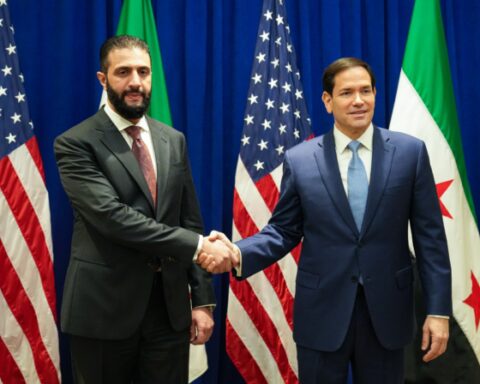Hamas said Friday it was reportedly prepared to release the remaining hostages in Gaza if certain conditions were met, marking its most direct response yet to President Donald J. Trump’s 20-point peace plan.
The U.S.-designated terrorist group praised the president’s efforts but sought clarifications over Israeli withdrawal, weapons restrictions and security guarantees, leaving much of the broader framework unresolved.
“I believe they are ready for a lasting PEACE,” Mr. Trump wrote on social media after receiving Hamas’s response. Later, speaking from the Oval Office, he thanked Arab nations for assisting in mediation. “This is a big day, we’ll see how it all turns out,” he said. “We have to get the final word down and concrete.”
The announcement from Hamas came hours after Mr. Trump set a stark deadline: support the plan by Sunday evening or face devastating consequences. “All HELL, like no one has ever seen before, will break out,” the president warned, promising that “THERE WILL BE PEACE IN THE MIDDLE EAST ONE WAY OR THE OTHER.”
In a statement, Hamas said it had agreed “to release all occupation prisoners — both living and the remains of the deceased — according to the exchange formula set forth in President Trump’s proposal.” As many as 20 of the 48 remaining hostages are believed to be alive. But the group made clear it was not signing off on all of the plan’s provisions, saying future governance and Palestinian rights must be decided “within an inclusive Palestinian national framework.”
Senior Hamas official Mousa Abu Marzouk told Al Jazeera the group had accepted “the plan’s main outlines in principle, but its implementation requires negotiations.” He added that releasing hostages within 72 hours, as Mr. Trump had demanded, was “unrealistic,” citing the involvement of other militant groups holding captives.
The president’s plan, if fully adopted, would create what the White House has called a “Board of Peace” chaired by Mr. Trump himself, oversee interim governance of Gaza, and deploy an Arab-led stabilization force.
It envisions Israeli withdrawal from frontline positions while keeping a security buffer around the enclave, along with the release of all hostages and the disarmament of Hamas.
Hamas leaders in Doha have privately signaled a willingness to accept many of the terms, according to Arab mediators, but remain unwilling to surrender all their weapons. The group has offered to hand over offensive arms to Egypt and the United Nations but insists on retaining what it describes as “defense systems.” It is also pressing for a firm timeline for Israeli withdrawal and clearer details on the mandate of any international peacekeeping force.
White House press secretary Karoline Leavitt posted an image of Mr. Trump recording a video about Hamas’s “acceptance of his Peace Plan.” But a senior administration official acknowledged that U.S. intelligence as recently as this week suggested Hamas was likely to reject the deal.
The president’s insistence has shifted momentum in recent days. After previous talks faltered, he secured the backing of Israeli Prime Minister Benjamin Netanyahu and cooperation from regional players including Qatar, Egypt and Turkey. Arab mediators caution, however, that divisions within Hamas leadership remain a major obstacle.
For Mr. Trump, the stakes are clear: securing the release of American and Israeli hostages while pressing Hamas toward capitulation. “Some Hamas fighters are trapped,” he warned Friday, “waiting for me to give the word, ‘GO,’ for their lives to be quickly extinguished.”
The president, who campaigned on restoring American strength abroad, is once again placing himself at the center of high-stakes diplomacy. His message to Hamas was blunt — peace is possible, but only on terms that end the cycle of terror.
[READ MORE: Trump Administration Moves Toward Landmark Drone Deal With Ukraine]








